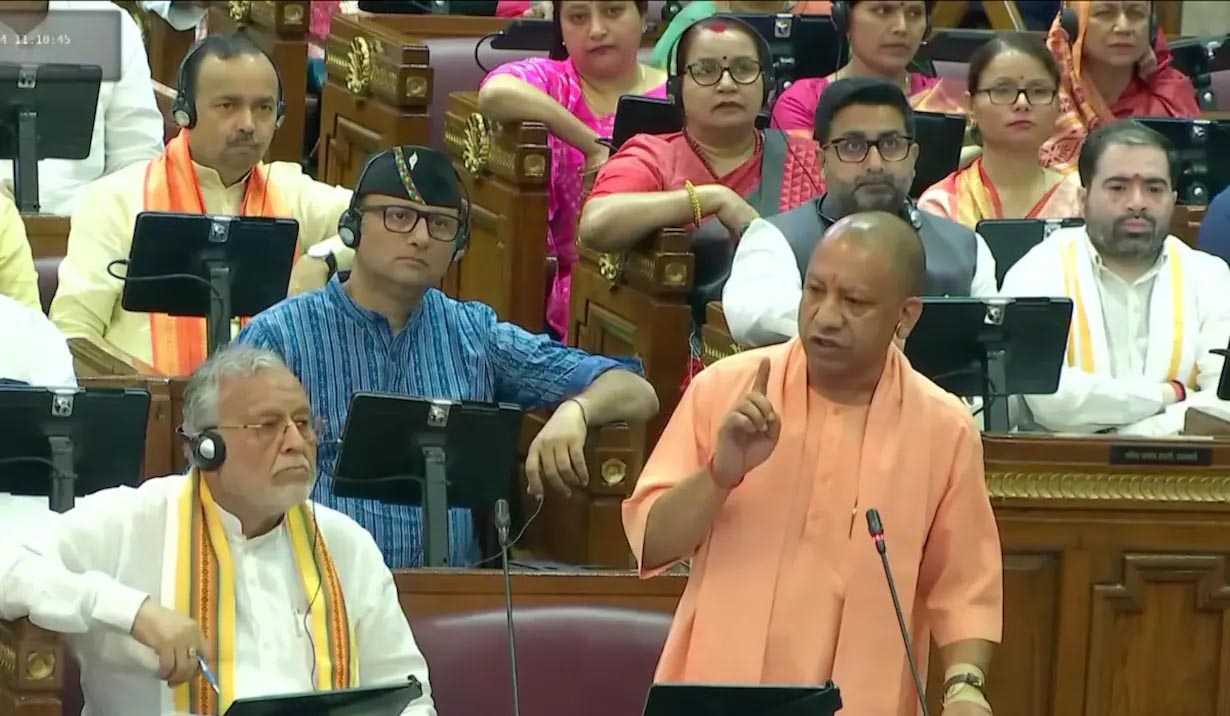On July 30, the UP assembly passed the amendments to its much debated anti-conversion law, the Uttar Pradesh Prohibition of Unlawful Conversion of Religion Act, 2021, bringing in a series of sweeping changes ranging from relaxation in the filing of a complaint to allow any person to file the case, increasing maximum punishment from 10 years to life imprisonment, restricting the bail provisions, and incorporating ambiguous provisions which punishes a person who, “with the intension to cause religious conversion, puts any person in fear of his life or property, assaults or uses force, promises or instigates marriage, conspires or induces any minor, woman or person to traffic or otherwise sells them or abets, attempts or conspires in this behalf, shall be punished with rigorous imprisonment of not less than 20 years, which can extend to life imprisonment”, Indian Express reported studying the provisions of the bill.
The statement of the reasons for the Uttar Pradesh Prohibition of Unlawful Conversion of Religion (Amendment) Bill, 2024 notes that “Keeping in mind the sensitivity and seriousness of the crime of illegal religious conversion, the dignity and social status of women, and the organised and planned activities of foreign and anti-national elements and organisations in illegal religious conversion and demographic change, it has been felt that the amount of fine and penalty provided in the Uttar Pradesh Prohibition of Unlawful Conversion of Religion Act should be increased and the bail conditions should be made as stringent as possible”.
Earlier, Section 4 of the Act read, “Any aggrieved person, his/her parents, brother, sister, or any other person who is related to him/her by blood, marriage or adoption may lodge a First Information Report of such conversion which contravenes the provisions of section 3.” With the latest amendment, the provision has been changed to include “any person”, thus even unknown people, not related to the person in question can file complaint on their behalf. This can potentially lead to misuse of the provision, especially by right-wing groups, who often target minorities in an avowedly self-righteous manner.
The bill has also added provision to punish anyone using foreign funding for the purpose of religious conversion. The new provision added to the law states that “whoever receives money from any foreign or illegal institution in connection with unlawful religious conversion shall be punished with rigorous imprisonment for a term which shall not be less than seven years but which may extend to 14 years, and shall also be liable to pay a minimum fine of Rs 10 lakh.”, the Indian Express reported.
Similarly, before the amendment, Section 5 (1) of the Act read, “Provided that whoever contravenes the provisions of section 3 in respect of a’ minor, a woman or a person belonging to the Scheduled Caste or Scheduled Tribe shall be punished with imprisonment for a term which shall not be less than two years but which may extend to ten years and shall also be liable to fine which shall be not less than rupees twenty five thousand”. The maximum punishment under this provision has now been increased to 14 years imprisonment and a fine not less than 1 lakh rupees. A cognate provision dealing with mass conversion under the unamended law provided a maximum punishment of 10 years with a minimum rupees fifty thousand fine, which has now been increased to maximum imprisonment of 14 years with a minimum fine of 1 lakh rupees.
Most significantly, bail restricting provision is also added to the law, which is quite similar to the extraordinary laws like UAPA and PMLA. The added sub-provision to Section 7 of the Act reads, “A person accused of any offence punishable under the Act, if in custody, shall not be released on bail unless the public prosecutor is given an opportunity of opposing the application for bail for such release, or where the public prosecutor opposes the application for bail, the session court is satisfied that there are reasonable grounds for believing that he is not guilty of such offence and that no offence can be committed by him while on bail”. This additional qualification for securing bail could discourage courts from granting bail to the accused under the law, with a high possibility of such accused languishing in jails as undertrials. Given the fact that the existing law already reverses the burden of prove, the new amendments would further disempower accused under the law which says that the “burden of proof as to whether a religious conversion was not effected through misrepresentation, force, undue influence, coercion, allurement or by any fraudulent means or by marriage, lies on the person who has caused the conversion and, where such conversion has been facilitated by any person, on such other person.”
Notably, Citizens for Justice and Peace is the lead petitioner that has challenged the 2021 Uttar Pradesh Anti-Conversion law and similar laws passed in eight other states. The first petition challenging the anti-conversion laws of was filed in December 2020, which argued against the constitutionality of these laws enacted by the states of Uttar Pradesh (which initially issued it through an ordinance before enacting the Act), Uttarakhand, Himachal Pradesh, and Madhya Pradesh (WP Criminal Nos 428/2020). In December 2021, it filed another petition, this time challenging the similar laws passed by Chhattisgarh, Gujarat, Jharkhand, Haryana and Karnataka (WP Criminal Nos 14/2023). CJP has argued that the said laws are violative of Article 14 (due process), 21 (right to life and personal liberty), and 25 (freedom of conscience and religion), and therefore unconstitutional.
Related:
SC issues notice to 5 states in CJP’s renewed challenge to anti-conversion laws | CJP
